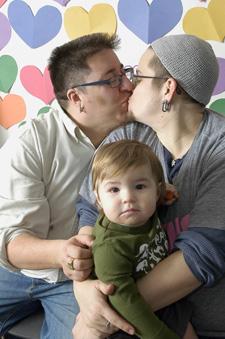One of the privileges of being a non-trans, heterosexual couple is that they already know how to make a baby (or at least where to begin). Poor governmental choices regarding sex education notwithstanding, it’s the rare straight person in this day and age who reaches her or his wedding night ignorant of how to summon the metaphorical stork: tab A, slot B. Off you go.
For queer and trans people, there are often more choices, plus legal complexities, plus cultural questions to answer, plus everybody else’s questions to answer (“How did you find a white baby?” tops my personal list of stunners). It’s all a bit daunting. Thank goodness, then, that The 519’s Parenting Program and the LGBT Parenting Network have put together a weekend-long Queer and Trans Family Plannings course.
This is not your mother’s Dykes Planning Tykes (DPT), nor your father’s Daddies and Papas 2B (DP2B), both venerable offerings from this duo of orgs.
“Twenty years ago,” explains course co- leader j wallace, “lesbians who visited fertility clinics or sought prenatal care were met with great hostility. Gay men felt unwelcome to adopt children. Now both of those have largely been normalized in Ontario, which is a wonderful step. This course takes the next step.”
(Full disclosure: I am married to j wallace, and we parent a small boy together. Further disclosure: Chris Veldhoven, who runs parenting programs for The 519, is a close friend of ours and the beloved playmate of aforementioned small boy. Additional disclosure: I did my research by calling around to our friends, many of whom we have shared support with in the process of making our families. I am steeped in the queer and trans communities of Toronto, especially those of us who are or hope to be parenting.)
“The next step” to which wallace refers is service to the demographics that do not fit tidily into either DPT or DP2B.
Couples in which one or both partners are trans, nonromantic co-parenting pairs, single ’mos choosing to be single parents, polycules of multiple committed adults trying to negotiate both legality and emotion, and many others are welcomed to this class.
“We found that people had a reluctance if they didn’t feel the language of the class included them,” says Veldhoven. “We want the information to be available; we want discussion and learning. But we also want to honour all the kinds and ways of family we have.”
Syrus Ware, a member of the original working group that produced the first trans men’s parenting course back in 2008, remembers wrestling with these questions.
“People were not finding a home in either of the courses and so were taking both. They needed the information about their body parts and functions, but they also really needed the affirmation of their identities.”
Ware notes that he is “delighted, really” to hear the course leaders’ plans to include information for trans women, who he says “always get left out of these parenting conversations.”
In the world of pre-parenting, many of the most informative resources are written with a distinctly hetero bent (even if some have updated with the “new inclusive language” of “partner” instead of “husband,” that person is still always referred to as he). Even queerly focused books continue to assume that readers are non-trans and in romantic couples. And the industry that has built itself around alternately scaring and soothing pregnant people is gendered in the extreme.
My fabulous sister-in-law, who is indeed straight and not generally disinclined toward feminine things, loathed the pregnancy marketing machine. She hated being forced to hunt for the one pregnancy top that wasn’t covered in bows or little pastel flowers. She was exhausted by medical professionals and store clerks alike who would greet her (and only her, never my brother) at the beginning of each appointment with an ebullient “Hi, Mom!”
What’s the matter with that? For my sister-in-law, it reduced her from a whole person to a giant baby cozy, which she did not appreciate. But what if she’d been a surrogate, having a baby whose mother she would never be?
What if she’d been a pregnant trans man, demoralized by the need to police his gender constantly in medical settings? Or a trans woman who also intended to be called “Mom,” erased from the picture by the fact that her body happened to produce sperm instead of an egg?
Queer and Trans Family Plannings will provide some answers and support. The course will cover many options: fertility, adoption and surrogacy, family structures and legal issues, as well as complexities such as how to answer questions about family status, advocating for one’s self in medical settings, and language for discussing choices. Course co-instructors wallace, Veldhoven and Rachel Epstein of LGBT Parenting Network have also sent a pre-course questionnaire to participants, encouraging them to give some sense of what they’re looking for.
“There’s really too much information for one weekend,” explains wallace. “If no one in this particular group is considering surrogacy, than we can do a 15-minute overview and move on to what they do need to talk about.”
Participants will come away with 20 hours of information and instruction, which will include a panel of speakers from myriad parenting structures, a question-and-answer period with a family lawyer experienced in queer and trans family legal issues, a substantial coursebook, and probably a great deal of relief as troublesome questions are answered, or at least discussed.
And, as Veldhoven puts it: “We’re here when you’re thinking about babies, we’re here when you’re expecting babies, and we’re here once they arrive. This class is very much about saying ‘The 519 loves you and welcomes you, and whatever your household looks like we’re here for you.’”
Comforting, indeed.


 Why you can trust Xtra
Why you can trust Xtra


